The Broadway premiere of Paradise Square, an epic new musical ten-years in the making by the team of Christina Anderson, Craig Lucas, and Larry Kirwan (book), Nathan Tysen and Masi Asare (lyrics), and Jason Howland (music, with additional music by Kirwan inspired in part by the songs of Stephen Foster), presents a fictionalized account of the events leading up to the New York Draft Riots of 1863, as imagined through the lens of the denizens of the titular saloon in Lower Manhattan’s Five Points neighborhood – America’s first slum and a melting pot of free Blacks and Irish immigrants.
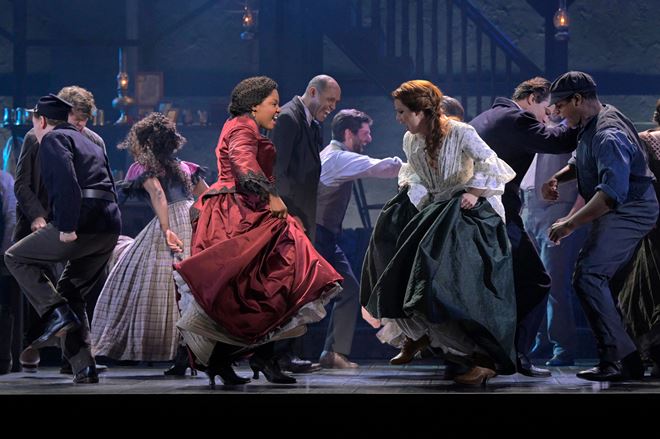
Directed by the acclaimed Moisés Kaufman (who was awarded the National Medal of Arts by President Barack Obama in 2016), an across-the-board outstanding company of nearly three dozen triple-threats empathetically embodies the roles, featuring ten main characters led by Nelly O’Brien (the superb Tony-nominated powerhouse Joaquina Kalukango), a strong and stalwart Black woman who owns and operates the deeply-in-debt Paradise Square and sets the stage for the tumultuous era and locale.
We then meet, one by one, the other central figures, who draw us into the individual stories of their backgrounds, inter-relationships, and struggles, and introduce us to the complicated plot lines that, as a result, become personal, compelling, and easy to follow. They include Nelly’s white Irish husband Willie (played with cheerful flirtatious devotion by Matt Bogart), dedicated to fighting in the Civil War and ending slavery in the South; his Irish-Catholic sister Annie (a feisty but loving Chilina Kennedy), Nelly’s closest friend who helps manage the tavern; and Annie’s Black husband, the Reverend Samuel Jacob Lewis (Nathaniel Stampley, delivering the minister’s even-tempered wisdom and righteousness to perfection), who also has another job outside the church, for which he hires the workmen (which will later become a significant issue).
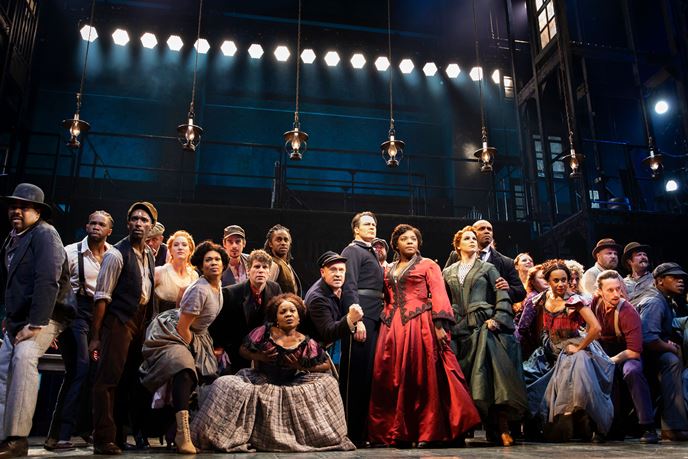
The harmonious inter-racial family is joined by Annie’s nephew Owen (A.J. Shively), just arrived from Ireland with the hopes of a better life in America; friend and regular ‘Lucky’ Mike Quinlan (Kevin Dennis), who proudly enlists in the war, then has a dramatic change of heart; Washington Henry (Sidney DuPont) and his girlfriend Angelina Baker (Gabrielle McClinton), escaped plantation slaves separated while making their way up North via the Underground Railroad (which the Reverend also serves); the villainous politico and racist anti-abolitionist Frederick Tiggins (Josh Davis filling in for John Dossett at the performance I attended); and drunk and destitute piano player and composer ‘Milton Moore’ (Jacob Fishel), who captures it all in the songs he shares with the wrong people. Each and every portrayal is believably human, in all the best and worst ways.
Along with the lead cast, the multi-talented company performs energetic, expressive, and highly entertaining segments of song and dance that are integral to both the historical period and the fictional narrative. The songs (with music supervision, music direction, and orchestrations by Howland) include Foster’s now infamous “Camptown Races” and Kalukango’s blockbuster vocal “Let It Burn” (which garnered thunderous applause and an extended and well-deserved standing ovation). And the dance (choreographed by two-time Tony Award winner Bill T. Jones, with musical staging by Alex Sanchez) is especially noteworthy, featuring dazzling segments of juba (which originated with Black slaves in the antebellum South) and traditional Irish step-dancing in Five Points – the actual place where tap dancing (a mingling of the two styles) first began – with breathtaking solos by featured dancers Shively, DuPont, Colin Barkell, and Garrett Coleman.
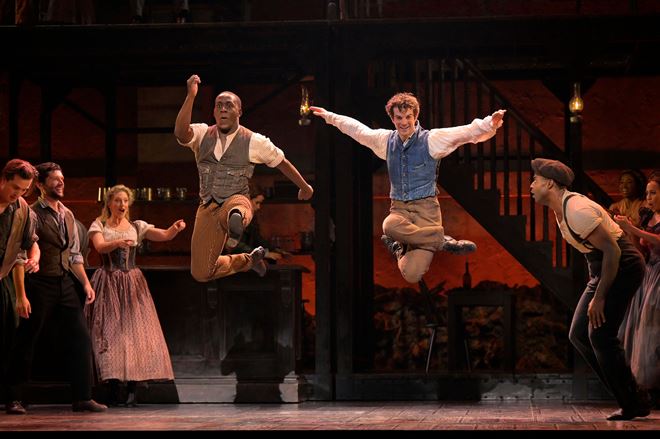
As the story progresses, so does the Civil War and the personal toll it takes on the characters and the racial harmony of the community. There are pivotal scenes of Lucky returned from battle and unable to find work; the Federal Draft instituted by President Lincoln, which conscripted white men and immigrants between the ages of 25-45 into the Union Army but excluded Blacks, who were not considered citizens, and permitted the wealthy to buy their way out for $300; a dance competition held by Nelly at Paradise Square to absolve her large debt, in which Owen and Washington compete for the $300 prize (a lot of money in 1863, and desperately needed by both); and Tiggins’ divide-and-conquer political/economic strategy pitting Irish against Black – all here inciting the violent and deadly New York Draft Riots that actually occurred in July of 1863, and threatened the “little Eden” of Paradise Square. Will the friends, families, and residents of Five Points put aside their differences and come back together to save their favorite communal gathering place, and restore peace and harmony to their neighborhood?
The well-researched, masterfully performed, and smartly imagined historical fiction is supported by a transportive design, with a lavish array of period-style costumes by Toni-Leslie James that indicate the cultural identities and economic status of the characters; a mostly dark and brown bi-level tenement set and rotating saloon by Allen Moyer and projections by Wendall K. Harrington and Shawn Boyle that establish the time and locale; and evocative lighting by Donald Holder and sound by Jon Weston, in a fascinating and timely look at a momentous occurrence in New York’s past that should not be forgotten now.
Running Time: Approximately two hours and 35 minutes, including an intermission.
Paradise Square plays through Sunday, July 17, 2022, at the Barrymore Theatre, 243 West 47th Street, NYC. For tickets (priced at $39-250), go online. Everyone must wear a mask at all times inside.


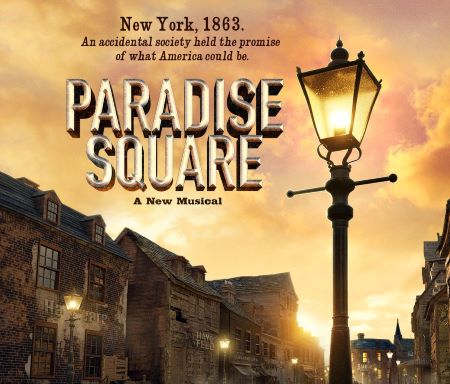


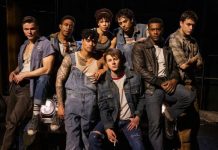
Any mention of religion? Anti-Catholicism was major issue with the “Know Nothings,” the forerunner of the Republican Party.
One of the main characters was a Minister, and the Irish immigrants were Catholic, but the message of the show was about a mixed community coming together and getting along.